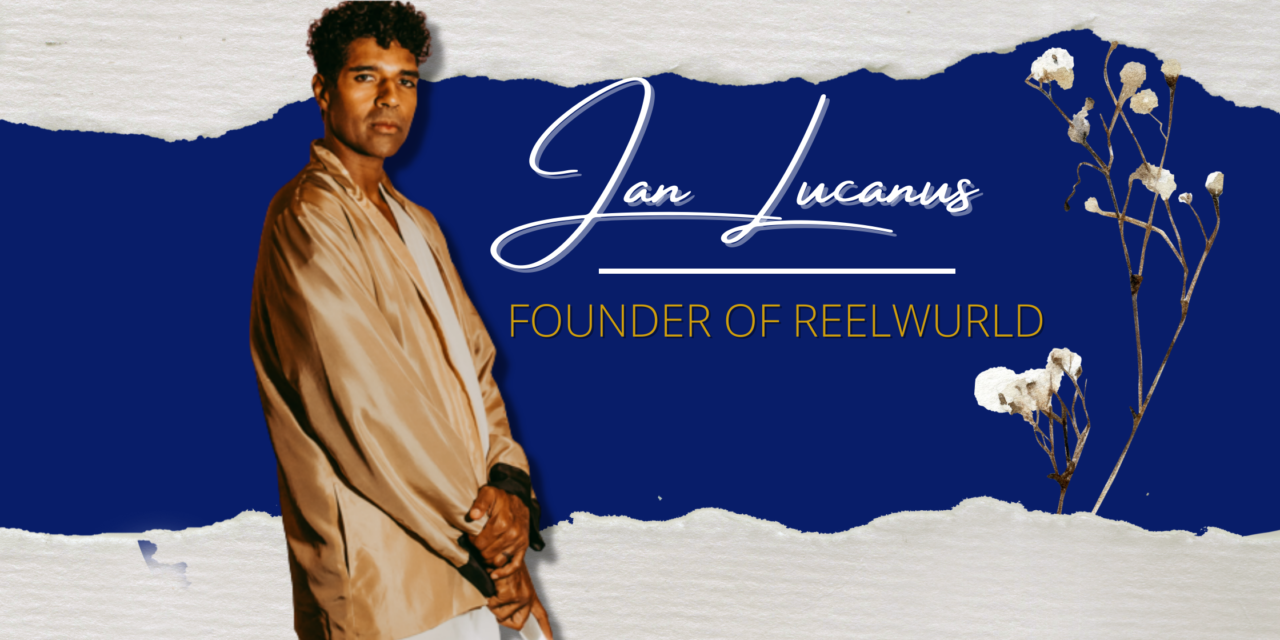Photo Credit: Tahis Aquino Photography
Jan Lucanus has a pedigree that reads like a superhero filmmaker’s dream, an award-winning martial artist, comic book writer, filmmaker, and entrepreneur. He’s created a groundbreaking way for the everyday person to become the star of a superhero saga on their phone. A graduate of New York University Maurice Kanbar Institute for Film & Television, Tisch School of the Arts, he could spend his days in production meetings going along with the status quo of filmmaking. Instead, this visionary creator drives for Lyft, sharing his story with every passenger that enters his vehicle generating a grassroots movement to inspire the next generation of filmmakers and action stars with his startup tech app ReelwUrld.
ReelwUrld is the first social network where everything users post is part of a movie/TV show. They’ve built patent-pending technology that acts like a film studio in your pocket. Anyone with a phone can join and create! Just like social media, but within a story that connects all of the content and makes the users the stars of the show Justice For Hire!
Justice For Hire (JFH) is the inaugural show from ReelwUrld, the first social film studio focused on making movies and shows with the audience as stars, directors, and producers. JFH benefits from ReelwUrld’s board of advisors, including Jeff Gomez (advisor to Disney’s Marvel & Star Wars franchises) and former FBI Negotiator Chip Massey. Justice For Hire is about an entrepreneur who made an app like “Uber for heroes”—everyday people can hire a hero or become one and get paid.
Jules: When did you discover your passion for entertainment?
Jan: My passion for entertainment stems from wanting to live in other worlds I’ve experienced in comics, cartoons, movies and games, and knowing that storytelling is the easiest way to reach the most people. That was something that I always felt as a kid, and I wanted access to people’s hearts and minds. I grew up in the comic book business in New York. My father was a comic critic and writer. He and my mom played a lot of video games as well. I started making my own comics at seven years old and I always thought about how cool the characters would be in video games. I loved cartoons, but I didn’t love movies when I was a kid. It wasn’t until I saw John Woo’s The Killer that I knew what a director was. The way he moved the camera showed me a new way to look at reality and I wanted to make my world look and feel like that with my own creative spin on it. After trying computer programming to make video games and disliking it I wasn’t sure what to do with my love of epic stories. Then a few months later my dad came home from comic book legend Neil Adams’ office with a brochure for the New York Film Academy and asked me if I wanted to spend my next summer learning filmmaking. I immediately thought about John Woo and said yes. I loved it and chose to study film at NYU immediately after. That sent me on the trajectory that I’m on now.
Jules: What has been missing for creatives in Hollywood?
Jan: What’s missing for creatives in Hollywood is that Hollywood cannot move at the speed of culture. It’s always behind culture, operating in a self-serving way, rather than recognizing the opportunities that exist by serving talent and the creative spirit of the audience. That results in executives afraid to say no and not saying yes, effectively wasting time (money) for the studio and the creative whom they’re meeting with. That results in actors vying for jobs that they don’t get because the talent pool is too big and the opportunities too few. That results in filmmakers making films that aren’t seen, because the festival circuit isn’t where their true audience is. That results in only 16% of screenwriters who get a feature film made going on to write a second one (you can look at Steven Follows’ research for that data). And certainly worst of all, that results in the mistreatment of the audience. The fans – who at the end of the day pay for these movies the studios love to sell them – are thought of as lesser minds. Those lower expectations of the audience have degraded Hollywood filmmaking, which in turn degrades our society, as the stories aren’t challenging the audience. Hollywood has set an amazing precedent for how grand cinema can be, yet at the same time systems of toxicity have created a ceiling for Hollywood. Between the impact of Covid, blockchain, AI and more, we’re in the midst of a great cultural restructuring and it’s only going to increase in magnitude. I feel very fortunate that all of my passions that amount to my life‘s work have come together, beautifully timed with this transitional period in culture and the business of filmmaking. We are poised to take advantage of the opportunity of working with underutilized talent from across the industry and make significant impact in the world through cinematic community storytelling.
Jules: You have built an app that’s a Hollywood Studio which you have described as, “Think the Marvel Cinematic Universe, but crowdsourced.” Tell us how your app is giving power to fans and brands.
Jan: Fans first. As a fan in the audience, I’ve always wanted to be able to contribute to my favorite movies and shows, but there’s never been a platform to do that on, so we built one. ReelwUrld is a cinematic social network where everything you post is part of a movie or show that we’re making together as a community. Our app will help you make a character, help you shoot scenes as that character, and then tie your scenes together with other people’s scenes to expand the storyline. Revenue on the fan side is currently merchandise, where our users – which we call Cast Members – can buy merch from our first show, and for select Cast Members, sell their own merch. There’s a Patreon for our first show Justice For Hire where fans can support and purchase exclusive content and experiences. There’s a revenue share model on any content we monetize that reaches profitability, and we plan advertising and sponsorship rev share for Cast Members in the near future.
For brands, studios, and networks with franchise IP, we offer them a container for story. When you look at your story as a container for other people’s stories, you can open up a world for them to contribute in meaningful ways. We help stakeholders think about story differently, like open-source software that can be adapted to any IP or brand initiative. We charge a fee that includes our narrative design consulting, licensing our technology, and guidance through ReelwUrld’s patent-pending process.
Justice For Hire is about an entrepreneur who made an app that’s like “Uber for heroes”—everyday people can hire a hero or become one and get paid.
Jules: How does the app truncate every stage of filmmaking?
Jan: There is a simplified diagram of how ReelwUrld truncates every stage of filmmaking on our Wefunder page. To give an example, development and production are traditionally separate phases in the filmmaking lifecycle – writers figure out the idea before physically producing it. However, on ReelwUrld, we’re always in production, meaning that our community can always contribute to any part of the story and develop new elements. If an episode of a show we’re producing gets released, a Cast Member can go back to that episode and add their character’s parallel personal story to that moment in our timeline, expanding the narrative from their perspective that may impact other characters and future episodes.
Jules: Tell us about Justice For Hire.
Jan: Justice For Hire is our first show made with a community. Anyone who wants to be a superhero or super villain can join the cast for free right from their phone on JusticeForHire.app. The premise of JFH is simple: it’s like Uber, but for heroes – you can hire a hero or become when and get paid. That concept allows us to have an infinitely expanding cast of heroes and villains and clients that hire them. When you join or cast, you choose one of those three roles and make scenes from that perspective. Those scenes then live on our app as part of the JFH Cinematic Universe that anyone can watch, while select scenes make it into episodes of the show that we edit together to tell the main storyline that unites all characters.
Jules: Do you offer white label for brands?
Jan: We’ve explored the white label model in the past. We’re still open to it for the right projects.
Jules: “ReelwUrld aims to be the hub of creative fandom-the biggest conductor of collective storytelling in the world. Share your vision for ReelwUrld.
Jan: The vision for ReelwUrld is to start small and grow big. We have one show right now, Justice For Hire, on one app. We’ll expand to have infinite shows created by fans and brands alike on a single platform that’s akin to a story-driven version of TikTok or YouTube. This cinematic social network will allow ReelwUrld to build a social film studio to produce Hollywood-scale content with people across the world. This will include in-person experiences from physical production to in-character sports competitions and more. We see social filmmaking as a true lifestyle that enables all fandom communities to gather, create, and positively impact each other’s lives through cinematic storytelling. In a time when short form content is outperforming longform, I believe we’ll see a return to the longform, but it will include the creativity of the audience. With that investment of the creative heart of fans – seeing ourselves united on screen and in the real world – the future of film and television is going to be one that reminds us that there is no limit to what we can accomplish together as a human race.

Jules: Will your software be a game-changer?
Jan: 2023 is all about letting more people know that we exist. We’re doing our first equity crowdfunding campaign on WeFunder.com/reelwurld to allow fans to become owners in ReelwUrld and help expand our company. The immediate next step is to get the word out through in-person experiences. We currently have a partnership that allows us to be at every comic con nationwide this year, but we need a marketing budget to follow through with this opportunity. Part of the investment funds we raise from the crowd will go towards marketing, while the majority will help expand our technology. We can only change the game with you on board!




